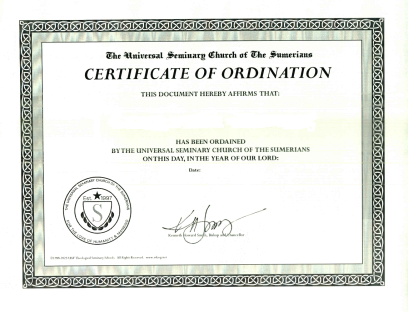The Sumerians
As Bishop and Chancellor, it is with great honor and pride to extend to you the Blessings of the Seminary and Church, with the Love Of the Universe, Peace, and Happiness; and that you will always do the right things in life to improve our brothers and sisters all over the world. Always! Go in Peace.
Ordination
Ordination is the process by which individuals are consecrated, that is, set apart as clergy to perform various religious rites and ceremonies. The process and ceremonies of ordination varies by religion and denomination. One who is in preparation for, or who is undergoing the process of ordination is sometimes called an ordinand. The liturgy used at an ordination is sometimes referred to as an ordinal.
the sumerians certificate of ordination.[...]
Portable network image format [1.2 MB]
Comments
The Universal Seminary Church of The Sumerians
- What It All Means
A doctorate in theology uses an academic perspective to explore the nature of the divine, religious beliefs and practices, and the role of religion in society. Theology can explore spiritual traditions throughout the world, but most theology Ph. D. programs in the U.S. study Christianity and the Bible.
Doctor of Divinity
A Doctor of Divinity (D.D. or DDiv; Latin: Doctor Divinitatis) is the holder of an advanced academic degree in divinity. In the United Kingdom, it is considered an advanced doctoral degree. At the University of Oxford, doctors of divinity are ranked first in "academic precedence and standing", while at the University of Cambridge, they rank ahead of all other doctors in the "order of seniority of graduates".In some countries, such as the United States, the degree of Doctor of Divinity is usually an honorary degree and not a research or academic degree.
Doctor of Divinity
Doctor of Divinity is an advanced academic degree in divinity. Historically, it identified one who had been licensed by a university to teach Christian theology or related religious subjects. In the United Kingdom, a Doctor of Divinity has traditionally been the highest doctorate granted by universities, usually conferred upon a religious scholar of standing and distinction. In the U.S.A., the D.D. is traditionally an honorary degree granted by a church-related college, seminary, or university to recognize the recipient's ministry-orientated accomplishments.
Social Epoch - The Mission of The Universal Seminary Church of The Sumerians, a unit of The Univerisity of Angel Fire Theological Seminary
Electronic media facilitates easy connections between people on opposite ends of the globe. Learn how electronic media may assist us in mass communication by allowing us to send a message to a large number of people. People are educated in many areas through the media, where they can learn a lot about politics, the environment, and other topics. MOOC courses, as well as classes from around the world, can help you improve your resume. You can also self-learn in any subject you want.
People are no longer blind. They have more information than they require. Television, for example, is an excellent way for people to learn about things that would otherwise be difficult to learn about. People are made aware of global events through electronic media. Many cultural events taking place across the world can be seen through electronic media. You can play peek-a-boo throughout the world from the comfort of your own home.
Honorary Doctorate
The Christian Bible Institute & Seminary welcomes the opportunity to receive recommendations and nominations of persons in the ministry who deserve the special recognition and honor of receiving
the Honorary Doctorate of Divinity Degree. However, each applicant must meet the criteria established by the CBIS Board of Regents which will also be based upon their evaluation of information
provided about the candidates. The Honorary Doctorate Degree is conferred upon distinguished Pastors, Evangelists, Ministers, and other Christian Leaders or Public Servants who have made significant
contributions in their respective fields or for the extension of God’s Kingdom.
An honorary degree or a degree honoris causa (Latin:” for the sake of the honor”) is an academic degree for which a university (or other degree-awarding institution) has waived the usual
requirements, such as matriculation, residence, study, and the passing of examinations. The degree is typically a doctorate and may be awarded to someone who has no prior connection with the
institution.
The Honorary Doctorate Degree is a donor-based award that is awarded solely for the accomplishments and contributions that a person has made. CBIS does not sell its Honorary Degrees, however, there is a suggested donation amount. Please do not contact us if it is your desire to receive this degree at no cost. The suggested donation amount and the necessary qualification must be met in order to receive this degree.
To recommend a candidate you may fill out the form below. Please make sure that you or the candidate meets the necessary qualifications in order to receive this degree before making the suggested donation amount. All donations and fees are non-refundable.
Should it become known publicly or otherwise that the degree recipient no longer represents the purpose and mission of CBIS or is found to have serious integrity issues, CBIS may withdraw the Honorary Degree.
Get prestige and credibility when representing yourself as a man of God.
Unfortunately, when you minister to people without a degree behind your name, people don’t take you seriously. For this reason, we are offering honorary degree credentials to deserving Christians
with deep biblical knowledge. The prestige of being honored with this degree gives you credibility, it is not issued for employment purposes - it is honorary.
An Honorary degree is not an earned degree, you did not earn it by completing the required hours and courses required for an earned degree. It is an honor being bestowed on you because we believe you have deep knowledge of the bible based on the score you archived on your evaluation test.
Ordination
Ordination is the process by which individuals are consecrated, and set apart as clergy to perform various religious rites and ceremonies. The process and ceremonies of ordination vary by religion
and denomination. One who is in preparation for, or who is undergoing the process of ordination is sometimes called an ordinand. The liturgy used at an ordination is sometimes referred to as an
ordinal.
Ordination Buddhism
The tradition of the ordained monastic community (sangha) began with the Buddha, who established orders of monks and later of nuns. The procedure of ordination in Buddhism is laid down in the Vinaya
and Patimokkha or Pratimoksha scriptures. There exist three intact ordination lineages nowadays in which one can receive an ordination according to the Buddha's teachings: Dharmaguptaka Lineage,
Mulasarvastivadin Lineage, Theravada Lineage
Ordination Christianity
Ordination (Roman Catholic, Orthodox, and Anglican churches) is one of the seven sacraments, variously called holy orders or cerebrotonia ("Laying on of Hands").
Apostolic succession is considered an essential and necessary concept for ordination, in the belief that all ordained clergy is ordained by bishops who were ordained by other bishops tracing back to bishops ordained by the Apostles who were ordained by Christ, the great High Priest (Hebrews 7:26, Hebrews 8:2), who conferred his priesthood upon his Apostles (John 20:21.23, Matthew 28:19.20, Mark 16:15.18, and Acts 2:33).
There are three "degrees" of ordination (or holy orders): deacon, presbyter, and bishop. Both bishops and presbyters are priests and have the authority to celebrate the Eucharist. In common use, however, the term priest, when unqualified, refers to the rank of presbyter, whereas presbyter is mainly used in rites of ordination and other places where a technical and precise term is required.
The ordination of a bishop is performed by several bishops; the Ordination of a priest or deacon is performed by a single bishop. The Ordination of a new bishop is also called a consecration. Many ancient sources specify that at the Ordination of a Catholic priest (pre-1968 form of the Roman Rite). least three bishops are necessary to consecrate another, e.g., the 13th Canon of the Council of Carthage (AD 394) states, "A bishop should not be ordained except by many bishops, but if there should be necessity he may be ordained by three," and the first of "The Canons of the Holy and Altogether August Apostles" states, "Let a bishop be ordained by two or three bishops," while the second canon thereof states, "Let a presbyter, deacon, and the rest of the clergy, be ordained by one bishop" the latter canons, whatever their origin, were imposed on the universal church by the Seventh Ecumenical Council, the Second Council of Nicaea, in its first canon.
Only a person ordained to the priesthood may administer certain sacraments (most especially, hear confessions, serve as the ordinary minister of giving the host during Communion, anointing the sick- unction, presiding at Requiem or Memorial services or religious marriages involving a Mass, or celebrating any Mass- the Eucharist).
© 1988-2023 SDC Institute of The Humanities/BRTI-America/The Sumerians Seminary/The Voice Over Academy of America/[UAF]University of Angel Fire Theological Seminary & Schools. All Rights Reserved.






